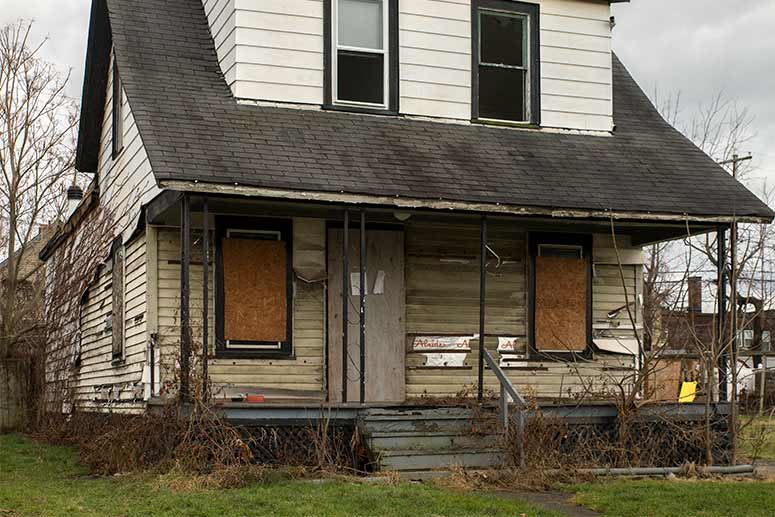A $700,000 grant will help save blighted, vacant homes and beautify CLE neighborhoods
 Bob Perkoski
Bob Perkoski
Ever since the real estate housing crash in 2008, Cleveland communities have been faced with tackling the problem of vacant and blighted homes—pulling down property values and aesthetic appeal in neighborhoods already struggling.
According to Justin Fleming, director of real estate for Cleveland Neighborhood Progress (CNP), there are about 9,500 vacant homes in the City of Cleveland. “I’d estimate that approximately 4,500 of those are structurally capable of being rehabbed within a reasonable budget,” he says. “The other 5,000 are likely structurally too far gone to reasonably save.”
But thanks to a three-year, $700,000 grant given to CNP by Detroit-based Quicken Loans, some of those homes with rehab potential will get that much-needed work. The grant is meant to provide CNP with funding for its efforts to stabilize housing markets and revitalize city neighborhoods.
“We’re really excited about this partnership with Quicken Loans,” says CNP president and CEO Joel Ratner. “We were looking for ways to rehab more homes to not only increase home ownership, but to also get these houses back on the tax rolls. We’ve been talking to them for a long time, and they’re also interested in [addressing] blight.”
The grant will help CNP with its strategic planning goals set for 2021, which include stabilizing residential values in all Cleveland neighborhoods, fostering a 15 percent increase in residential values in targeted east-side neighborhoods, and rehabbing 1,000 vacant residential units.
Additionally, the funds will allow for the creation of the Home Repair and Rehab Partnership program, through which CNP will provide grants to Community Development Corporations (CDCs) already initiating rehab programs in their communities.
Last week, CNP kickstarted that process by issuing a request for proposals to CDCs with existing rehab programs for its rehab facilitation awards. The awards will use about $400,000 of Quicken Loans grant money to provide $200,000 next year and $100,000 in both 2019 and 2020 to up to four CDCs. Recipients will also receive ongoing technical assistance from CNP.
Ratner says they are targeting primarily east side neighborhoods, which have been hit harder by vacancies and housing blight than the west side.
“We have racial equity in mind here,” he says. “When west side houses become vacant, they get picked up and rehabbed. With east side houses, the private market doesn’t come in and absorb them, so we really need to rehab houses on the east side.”
While Ratner says he won’t know which neighborhoods will benefit from the grants until the applications are filed and a task force chooses the recipients, he envisions communities like Glenville, Buckeye, Mt. Pleasant, St. Clair Superior, Union Miles, and Lee Harvard as some of the possible recipients.
“We’re looking for neighborhoods where we want to support the markets that have been dormant,” says Ratner. “We’re looking for active CDCs that will provide the best return on investment.”
The remaining $300,000 will be used as part of CNP’s five-year strategic plan, which includes stabilizing home values, creating a 15 percent residential value increase in targeted neighborhoods, and rehabbing 1,000 vacant homes by 2021.
According to Ratner, the whole purpose of the grant money and CNP’s programs is to rehab the city’s housing stock and find a solution for vacant properties—which cost the city and taxpayers money to maintain—and bring up property values.
“This is what makes Cleveland so special—it’s fantastic housing stock in these neighborhoods,” says Ratner. “It may take the next decade to reverse the decline in the tax base, but, really, this is an investment in our own communities and in us.”
Quicken Loans has run a similar program in Detroit with considerable success. “It’s pretty clear we need to get serious,” says Ratner. “Detroit has been a real leader in this area, so we’re excited to partner with Quicken Loans.”
Applications are due by the end of January and finalists will be announced in February. The finalists will then present their cases to CNP in a public forum in March before the grantees are announced and implementation begins in April.

